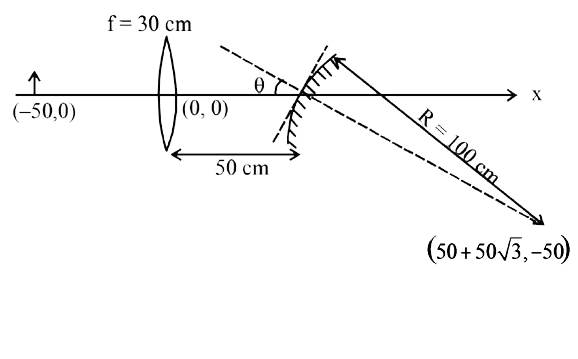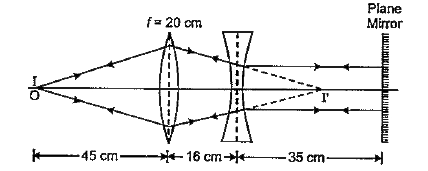A spherical mirror and a thin spherical lens each have a focal length of −15cm. The mirror and lens are likely to be
both concave
both convex
the mirror is concave and the lens is convex
the mirror is convex, but the lens is concave
The correct Answer is:a
To determine the nature of a spherical mirror and a thin spherical lens, both having a focal length of −15cm, we can follow these steps:
Step 1: Understand the Sign Convention
In optics, the sign of the focal length helps us identify the type of mirror or lens.
- For mirrors:
- A concave mirror has a negative focal length.
- A convex mirror has a positive focal length.
- For lenses:
- A concave lens has a negative focal length.
- A convex lens has a positive focal length.
Step 2: Analyze the Given Focal Length
The problem states that the focal length for both the mirror and the lens is −15cm.
Step 3: Determine the Type of Mirror
Since the focal length is negative, we can conclude:
- The mirror must be a concave mirror because it has a negative focal length.
Step 4: Determine the Type of Lens
Similarly, since the focal length is also negative for the lens:
- The lens must be a concave lens because it has a negative focal length.
Conclusion
Both the spherical mirror and the thin spherical lens are concave.
Summary of the Solution
- The mirror is a concave mirror (negative focal length).
- The lens is a concave lens (negative focal length).
---
In optics, the sign of the focal length helps us identify the type of mirror or lens.
- For mirrors:
- A concave mirror has a negative focal length.
- A convex mirror has a positive focal length.
- For lenses:
- A concave lens has a negative focal length.
- A convex lens has a positive focal length.
The problem states that the focal length for both the mirror and the lens is −15cm.
Since the focal length is negative, we can conclude:
- The mirror must be a concave mirror because it has a negative focal length.
Similarly, since the focal length is also negative for the lens:
- The lens must be a concave lens because it has a negative focal length.
Both the spherical mirror and the thin spherical lens are concave.
- The mirror is a concave mirror (negative focal length).
- The lens is a concave lens (negative focal length).
Topper's Solved these Questions
- BOOK - NCERT ENGLISHCHAPTER - LIGHT - REFLECTION AND REFRACTIONEXERCISE - Exercise28videos
LIGHT - REFLECTION AND REFRACTION
- BOOK - NCERT ENGLISHCHAPTER - ELECTRICITYEXERCISE - Exercise41videos
ELECTRICITY
- BOOK - NCERT ENGLISHCHAPTER - MAGNETIC EFFECTS OF ELECTRIC CURRENT SCIENCEEXERCISE - Solved Examples2videos
MAGNETIC EFFECTS OF ELECTRIC CURRENT SCIENCE
Similar Questions
A focal length of a lens 10cm. What is power of a lens in dipotre?
View SolutionSpherical aberration in a thin lens can be reduced by
View SolutionA spherical mirror forms an image of magnification3. The object distance, if focal length of mirror is 24cm, may be
View SolutionThe distance of an object from a concave spherical mirror is equal to the focal length of the mirror. Then the image.
View SolutionWhat is a spherical mirror?
View SolutionDetermine the position of the image produced by an optical system consisting of a concave mirror with a focal length of 10cm and a convergent lens with a focal length of 20cm. The distance from the mirror to the lens is 30cm and from the lens to the object is 40cm. Consider only two steps. Plot the image.
View SolutionIf a spherical mirror is dipped in water, does its focal length change ? 17. If a thin lens is dipped in water, does its focal length change ?
View SolutionA small object is placed 50 cm to the left of a thin convex lens of focal length 30 cm. A convex spherical mirror of radius of curvature 100 cm is placed to the right of the lens at a distance of 50 cm. The mirror is tilted such that the axis of the mirror is at an angle θ=30degree to the axis of the lens, as shown in the figure
If the origin of the coordinate system is taken to be at the centre of the lens, the coordinates (in cm) of the point (x,y) at which the image is formed are
 View Solution
View SolutionHow is the focal length of a spherical mirror related to its radius of curvature?
View SolutionThe figure below shows the positions of a point object 0, two lenses, a plane mirror and the final image I which coincides with the object. The focal length of the convex lens is 20 cm. Calculate the focal length of the concave lens.
 View Solution
View Solution
